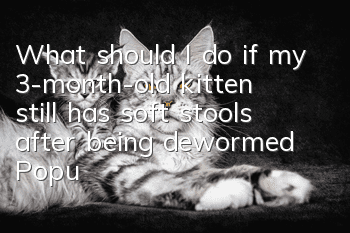What should I do if my 3-month-old kitten still has soft stools after being dewormed? Popular science on cats!

What should I do if my 3-month-old kitten still has soft stools after being dewormed? Cat science! Soft stools in cats should be the most common thing. Families who have raised cats will find that cats occasionally have soft stools, but If you have soft stools all the time, you need to pay attention to this issue.
What should I do if my 3-month-old kitten still has soft stools after being dewormed?
1. Soft feces caused by parasites
Cats over three months old can be dewormed once, which is helpful for timely removal of internal parasites or prevention Infection with parasites. If you are not sure whether your cat has parasites, check the feces. If there are white eggs or soft stools with blood, it is likely that parasites are to blame. If you are not sure, you can take your cat to the pet hospital for a fecal examination. After deworming, you should be careful not to feed the cat raw meat and maintain good environmental hygiene to avoid reinfection with parasites.
2. Digestive problems and stress response
Pay attention to fresh food when feeding your cat, and you also need to pay attention to which foods can and cannot be eaten. For example, it is best not to give milk, raw meat, and shrimp to cats as they can easily lead to soft stools. There are also people who like to feed canned food to cats, but they don’t know that some cats have difficulty digesting canned food and have soft stools. In addition, cats have relatively weak intestines and limited ability to digest food, and they are prone to loose stools. Changing the cat's food, giving vaccinations, deworming, changing the environment, etc. can easily cause the cat to have a stress reaction and loose stools.
If despite the above reasons, the cat still has soft stools, in this case, you need to take the cat to the pet hospital, especially if the cat does not eat very much and looks lazy. If the cat is not in good spirits, you need to check whether the cat has enteritis, feline distemper, or parvovirus, so that timely treatment can be facilitated.
- Why do cats scratch people? Why do cats like to scratch people?
- Why You Can’t Raise Yellow Cats Four Reasons Why No One Raise Yellow Cats
- What should cats eat to replenish their health after giving birth to kittens?
- What does it mean when a cat's tail twitches?
- How to bathe a cat when spring comes
- What should I do if my female cat urinates indiscriminately at home? How should I solve it?
- What does cat abdominal breathing look like?
- A piece of cat's skin is hairless and white meat is exposed
- Why do cats often lick their fur? What are the reasons?
- Do pet cats have bacterial infections?



